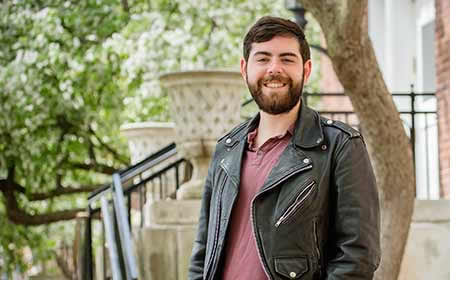Newsroom Archive

It takes a special kind of student to win a National Science Foundation Graduate Research Fellowship. Bennett Callaghan, who earned his B.A. in Forensic Psychology from John Jay in 2012, is one such individual.
Callaghan, now a doctoral student in psychology at the University of Illinois – Urbana-Champaign, won the NSF award to support his proposed research into the politics and psychology of social class. The fellowship will provide $30,000 per year for three years.
“John Jay prepped me in a lot of ways,” said the former Honors student and Justice Scholar. “John Jay got me interested in ‘justice’ as a general theme and as an interesting psychological and philosophical question. My classes taught me the particular skills I would need to do research — critical thinking, sound argumentation and good writing skills.”
Callaghan is a picture of evolving interests. Fresh out of Xaverian High School, he was taken by John Jay’s program in Forensic Psychology, “thinking along the lines of doing clinical work in legal settings or perhaps something akin to criminal profiling. At the time I hadn’t envisioned myself as an empirical researcher.”
But his focus did indeed change, and he became more attracted to the research side of psychology. He worked with former John Jay professor Ian Hansen, now at York College, on a study of the moral and political psychology behind people’s attitudes toward torture. He assisted Professors Evan Mandery, Amy Shlosberg and Valerie West on a project tracking exonerees after their release from prison (and earned co-authorship credit on two ensuing peer-reviewed articles). For his Honors thesis, he presented research into the relationship between compensating the wrongfully convicted and the likelihood of their committing crimes after release.
Disparate though his research interests may seem, Callaghan attributes the evolution in part to the influence of his mentors. “I always like to try to bring my own thing to the project,” he added. “Broadly, though, I like to think that all of them tie together, in that they all relate to people’s ideas about justice, as well as how institutions, such as the criminal justice system or the political system, function within society, and how people relate to those institutions on a psychological level.”
Callaghan said he chose UIUC for his doctoral study because of its reputation, “especially in producing researchers with very high standards for methodological and statistical rigor. At the same time, the program also encourages you to not lose sight of why what you’re doing is important.” Motivated by a desire to discover new things, Callaghan hopes to follow up his doctoral studies by becoming a university professor, but quickly adds, “I am also open to other opportunities as well, especially if they would involve conducting research.”
The NSF Graduate Research Fellowship program, now in its 62nd year, has helped support the graduate education and research interests of future Nobel Prize winners, Cabinet officials, and leaders in industry, commerce and academia.
 Inside JJC (Faculty & Staff)
Inside JJC (Faculty & Staff) Technology Services Status
Technology Services Status

